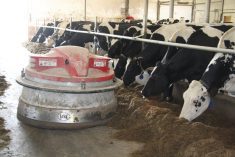When many countries including the United States closed their borders to ruminant exports on May 20, few realized that livestock such as llamas and alpacas were included in the ban.
It has been a difficult blow for breeders who rely on free movement across the borders to buy and sell camelid genetics.
Including these animals in the ban because bovine spongiform encephalopathy was found in an Alberta cow has baffled llama owners such as Sue Wilde of Raymond, Alta., and Rick and Laura Advich of Summerland, B.C.
Read Also

Manitoba extends Crown land rent freeze
Manitoba government links the continued rental rate freeze on grazing and forage leases to economic and environmental challenges facing the industry
Wilde said no form of transmissible encephalopathy, which includes BSE in cattle, chronic wasting disease in deer and elk and scrapie in sheep, has ever been reported in llamas and alpacas.
“I am supposed to be in Kentucky Oct. 3 with two females,” she said.
“I paid $1,000 US to be in the sale. Nobody is compensating me.”
She will have to keep and feed these animals until the ban is lifted.
“It’s been a beef oriented thing because they are so visible,” Wilde said.
The ban has prohibited breeders from showing and selling Canadian animals in the U.S., and they are losing money because of added feed costs and lost income. As well, money received for animals yet to be delivered may have to be repaid.
“I depend on my U.S. sales to pay off my operating account every year so I am just as strapped as other people,” said Wilde, who owns 70 llamas.
The meat is not commonly traded, with most used for personal consumption or sold at farmer’s markets. As a result, Wilde said allowing exports of boxed red meat does not help.
Canadians are still allowed to import American animals after a short quarantine.
The situation is equally problematic for Rick and Laura Advich. They had six alpacas ready for export to New York, but were told by the U.S. Department of Agriculture to call off their plans on May 20.
They also have American female animals at their farm for breeding, which cannot return to their owners until the ban is lifted. They cannot consign animals to American sales and are not interested in importing as long as the market is closed.
“As a result we have lost business. People aren’t even inquiring,” said Laura Advich.
“It’s going to come around but it is a waiting game. When you depend on a sale to tide you over the winter, it’s frustrating.”
When tuberculosis halted the movement of deer and elk across international borders more than 10 years ago, llamas and alpacas were also included. Trade stopped for more than six years, even though camelids do not harbour TB.
“We were just getting our U.S. business contacts back and here we are stuck again,” Wilde said.















